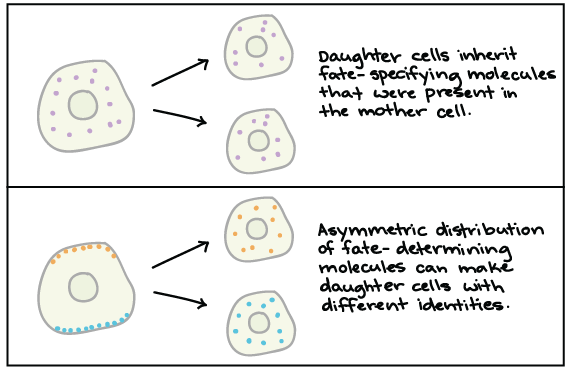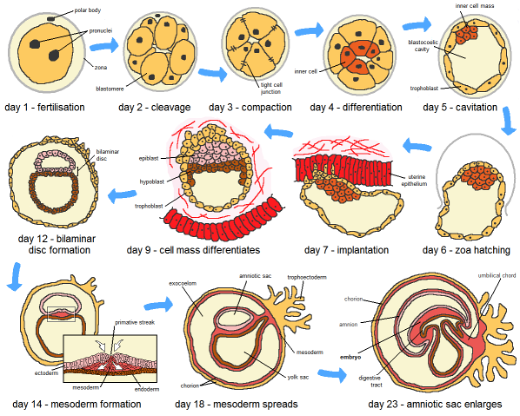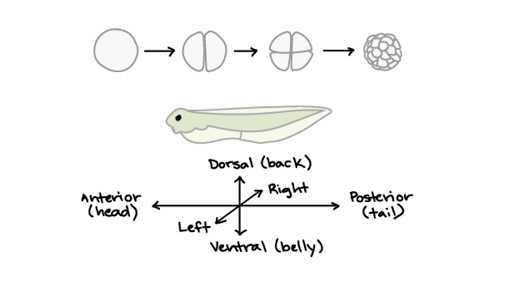How Does a Zygote Develop Into a Multicellular Organism
Recombination and communication 3. For multicellular organisms like us cell division allows an organism to grow and develop from a single cell to trillions of cells to repair.

Introduction To Development Article Khan Academy
A zygote is the first diploid cell that is formed by the fusion of male and female gametes resulting in the formation of an embryo.

. First one cell becomes two then two cells become four four cells become eight and so on and so forth until a. A zygote develops into a multicellular organism through 1. The endosperm is a source of stored food consisting primarily of starches.
Please answer quickly the question is timed. Over the course of hours days or months the organism turns from a single cell called the zygote the product of sperm meeting egg into a huge organized collection of cells tissues and organs. In multicellular organisms individual cells grow and then divide via a process called mitosis thereby allowing the organism to grow.
A multicellular organism develops from a single cell the zygote into a collection of many different cell types organized into tissues and organs. Zygote formation is the earliest developmental stage in the process of replicating a full individual in a human or other multicellular organism. - this occurs by cell division but this type of mitosis to divide a zygote is called cleavage.
By what process does a zygote develop into a multicellular organism. All this is further explained here. Development involves cell division body axis formation tissue and organ development and cell differentiation gaining a final cell type identity.
A zygote develops into a multicellular organism through 1 mitosis and specialization 2 mitosis and meiosis 3 recombination and communication 4 genetic engineering and natural selection. Genetic engineering and natural selection. Mitosis and specialization 2.
The zygote represents the first stage in the development of a genetically unique organism. Zygote is the fertilized cell that grows into a multicellular organism in sexual organismsThe embryonic germ layer divides and differentiates into the complex multicellular organism. How does the zygote form the organism FAQwhat zygote how does the zygote form the organism adminSend emailDecember 21 2021 minutes read You are watching what zygote how does the zygote form the.
During fertilization in multicellular organisms a sperm cell fuses with an egg cell to form a zygote. A seed begins to form an embryo following fertilization and the start of a zygote. The genome of the zygote is the combination of DNA in each gamete and contains all the genetic information required to form an individual.
One may also ask how do unicellular and multicellular organisms. The zygotes single cell contains all of the 46 necessary chromosomes getting 23 from the sperm and 23 from the egg. Mitosis and meiosis 4.
A multicellular organism develops from a single cell the zygote into a collection of many different cell types organized into tissues and organs. In a developing embryo all these processes are happening at once in a kaleidoscopic variety of. In the embryonic development of humans and other animals the zygote stage is brief and is followed by cleavage when the single cell becomes subdivided into smaller cells.
In which process are. Development involves cell division body axis formation tissue and organ development and cell differentiation gaining a final cell type identity. The process by which 3 layers of gastrula begin to form specialized body parts.
The zygote begins as a single cell but divides rapidly in the days following fertilization. After blank the zygote develops into a larger organism. Fertilized egg made from multicellular organism.
A zygote is an egg cell or ovum that has been fertilised by a sperm cell. A mitosis and differentiation. When split skin comes back together.
Cell proliferation cell specialization cell interaction and cell movement. The embryo is the young multicellular organism before it emerges from the seed. Zygote fertilized egg cell that results from the union of a female gamete egg or ovum with a male gamete sperm.
In multicellular organisms the zygote divides through the process of mitosis to form the embryonic body. Development involves cell division body axis formation tissue and organ development and cell differentiation gaining a final cell type identity. The zygote stage development occurs in the first week of fertilization.
As an embryo develops its cells divide grow and migrate in specific patterns to make a more and more elaborate body. Which process occurs as a zygote divides to form a multicellular embryo. How does a multicellular organism grow and develop.
3 layers of the gastrula. A multicellular organism develops from a single cell the zygote into a collection of many different cell types organized into tissues and organs. Bone cells reproducing to extend bone size.
A zygote also known as a fertilized ovum or fertilized egg is the union of a sperm cell and an egg cell. B recombination and communication d genetic engineering and natural selection. In this chapter we have discussed zygote definition formation of zygote development of zygote.
The four essential processes by which a multicellular organism is made. The seed coat consists of one or more protective layers that encase the seed. The human and mouse zygote DNA were replaced with somatic cell DNA of human and mouse respectively.
A totipotent cell can differentiate into any cell type. - once fertilization occurs the zygote immediately begins to divide. Pluripotentiality is attributed to a cell that has the capacity to develop into many other cell types but not another human organism.
C mitosis and meiosis. 3 A zygote develops into a multicellular organism through a. Then the zygote begins to divide.
A study compared development of mouse and human zygotes.

Chapter 7 Producing Form Development Inanimate Life

Introduction To Development Article Khan Academy

Life Cycle Of The Model Multicellular Organism A Development From Download Scientific Diagram
Comments
Post a Comment